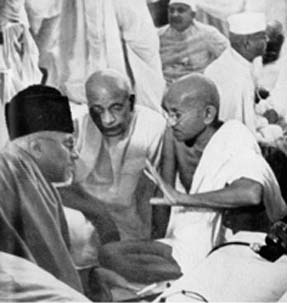
For about six years before World War 2 broke out, Gandhi stayed away from politics and left the fight for India’s independence to other politicians. Only the Second World War brought the Mahatma back into the public sphere. But before that, he served the country by traveling across India, mingling with women and children, and encouraging the use of the spinning wheel as a tool to achieve political independence. As World War II loomed, Gandhi advocated for peace and communicated with world leaders such as General Chiang Kai-Shek of China and American, Japanese, and British high authorities.
Most importantly, he pleaded with Adolf Hitler, whom he wrote to eight days before Germany invaded Poland in September 1939. Hitler was the dictator of the mighty German war machine and was the only person in the world who could stop the impending global conflict. Gandhi’s letter to Hitler was dated August 23, 1939, and he addressed Hitler as “dear friend.” He informed Hitler that people had been pressing him to write to the Nazi leader to save the world from massive violence but that he had only delayed because he felt that it was an act of arrogance to write to the Fuhrer. He acknowledged to Hitler that he was the only one in the world who could stop the imminent war and asked the German dictator if he could possibly listen to someone who had renounced violence. Gandhi ended his letter to Hitler by apologizing in advance for writing to the Nazi leader.
Hitler went on to invade Poland, and this ignited World War II. The United States, Great Britain, and the USSR banded together as the leaders of the Allied forces, while Japan, Germany, and Italy led the Axis forces. In the first week of July 1940, Gandhi wrote a letter to the Britons, requesting them to put down their weapons and let Hitler and Mussolini take what they wanted from Great Britain.
The British dragged India into its fight against Nazi Germany without holding talks with the nationalist leaders. This resulted in fierce protests from Congress and the Muslim League, which prompted British authorities to invite Gandhi to speak to the viceroy. Gandhi was still loyal to the British Empire, and so he declared his support for Britain and its allies. However, Jawaharlal Nehru, who would become the first prime minister of the Republic of India, was not as ready to help the British as Gandhi was.
He demanded that India would support Great Britain, but in return, India should be granted its independence after the war. Gandhi was opposed to this kind of negotiation because Great Britain was in a vulnerable situation under Nazi threat. According to his morals, one should not take advantage of anyone in a dire situation. But Nehru’s proposal was dismissed, and so Gandhi agreed to compromise with Great Britain’s forces by launching a civil disobedience movement of limited scale. In 1942, the British diplomat, Sir Stafford Cripps, arrived in India and offered that India be granted dominion status under the British Commonwealth after the war.
However, the offer of dominion status came with the proposal that India should be partitioned to create an independent state for Muslims. Gandhi, along with Congress, did not accept this and instead started to push for civil disobedience. In his Quit India speech in 1942, he called on the British to grant India independence. Hours after the speech, Gandhi and members of Congress were arrested by the British government and imprisoned at the Aga Khan Palace. Without Gandhi’s exhortations for peace, India became engulfed in violence. People protested the arrest by setting fire to police stations and train stations. The viceroy requested Gandhi to speak to the people and end the turmoil, but Gandhi turned him down. Instead, he began a fast that went on for three weeks.
This fast weakened Gandhi and British authorities worried about the consequences if he died in custody. However, they were more frightened of Gandhi if he were to be set free, so they decided to keep him In detention, kept company by family and friends. Gandhi was eventually released in May of 1944 when the war was in its last phase. He was deeply saddened by the death of his wife, Kasturbai, who died while he was in custody. Gandhi was also surprised by the major change in India’s political climate. Just a few years ago, the Muslim League was not a major political force, but now it had the strength to dictate its aims. Its leader, Muhammad Ali Jinnah, was now pushing to create a separate state for Muslims in India. At the end of World War II, the British were sending clear signals that India would be granted independence. But independence came at a great price because the Muslim League succeeded in its aims and convinced Congress and Britain to create an independent state for Muslims, which became known as Pakistan.